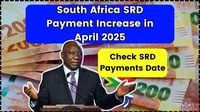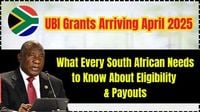In a significant move to provide continued relief to unemployed and vulnerable South Africans, the South African Social Security Agency (SASSA) has officially increased the Social Relief of Distress (SRD) grant starting in April 2025. This financial assistance program, first introduced during the COVID-19 pandemic, has undergone several updates to adapt to South Africa’s evolving socio-economic landscape. The SRD payment increase in April 2025 is not just a number change—it’s a commitment to helping citizens cope with inflation, unemployment, and financial uncertainty.
The SRD Payment Increase in April 2025 is more than a policy adjustment—it’s a much-needed lifeline for millions. With rising costs and persistent unemployment, every rand matters. Whether you’re a first-time applicant or a returning beneficiary, staying informed and proactive can ensure you get the support you’re entitled to. Be sure to apply early, verify your eligibility, and always double-check your payment method to avoid delays.
The new grant amount has been set at R390 per month, increased from R370. This adjustment reflects the government's recognition of the economic hardships faced by many South Africans. The payment window for the SRD grant is from April 25 to April 30, 2025, with payments being processed in batches according to the last three digits of beneficiaries' ID numbers.
To qualify for the SRD grant, applicants must meet specific criteria: they must be South African citizens, permanent residents, or approved asylum seekers aged between 18 and 59 years. Additionally, applicants must not receive any other form of income support such as UIF (Unemployment Insurance Fund), NSFAS (student financial aid), or any other SASSA social grant, and they must have a monthly income below R624.
Statistics South Africa (Stats SA) reports that the country’s inflation rate has hovered around 5.5% in early 2025, pushing up prices on food, transport, and utilities. The government recognized that the existing R370 amount was no longer sufficient to provide meaningful relief. Hence, the increase aims to better match the minimum subsistence needs of the unemployed population. This increase was confirmed in the 2025 National Budget Speech by the Minister of Finance and forms part of a broader plan to enhance income support and expand social protection systems.
Payments are scheduled as follows based on ID number suffixes: those with ID numbers ending in 000–199 will receive their payments on April 25, 2025; 200–399 on April 26; 400–599 on April 27; 600–799 on April 28; and 800–999 on April 29. Beneficiaries should be aware that payments may take 2–3 working days to reflect in their bank accounts, depending on their financial institution.
There are several ways to apply for the SRD grant. Applicants can do so online by visiting the official SASSA website, sending a WhatsApp message, using USSD codes, or applying in person at their nearest SASSA office. Once an application is submitted, applicants can track their application status through various channels, including the SASSA website and WhatsApp.
If an application is rejected, applicants have the right to appeal within 30 days. The appeals process requires entering the applicant’s ID number and mobile number on the SASSA appeals portal, where they can submit the necessary information to justify their eligibility.
In addition to the SRD grant, the introduction of Universal Basic Income (UBI) grants in April 2025 marks a monumental shift in South Africa’s social support system. Designed to bring dignity, stability, and opportunity to millions of citizens, the UBI initiative reflects the government’s commitment to social equity and long-term economic transformation.
The proposed monthly grant amount for UBI is R1,500, with eligibility set for adults aged 18 to 59 years. Unlike traditional welfare programs, UBI does not require specific conditions such as being unemployed or earning below a certain threshold. Instead, it acts as a universal safety net, ensuring that everyone can meet their basic needs and live with dignity.
Currently, more than 18.2 million South Africans live below the upper-bound poverty line (R1,558/month as of 2023). High levels of youth unemployment, rising living costs, and economic inequality have created a pressing need for structural reform. UBI is seen as a solution to provide immediate relief and long-term socio-economic empowerment.
The implementation of UBI will occur in phases. Phase 1, from now to mid-2025, involves the expansion of the SRD Grant, maintaining a monthly payment of R370 while verification continues to be means-tested. Phase 2, expected to begin late in 2025 and beyond, will see the launch of full-scale Universal Basic Income, where all South African adults aged 18 to 59 years will automatically become eligible without income verification or employment requirements.
The introduction of UBI is not just a policy change; it represents a vision for a more inclusive and resilient South Africa. It aims to alleviate poverty, boost economic participation, strengthen social cohesion, and build resilience among citizens affected by job losses or unexpected financial shocks.
As this chapter unfolds, staying informed and financially responsible will help beneficiaries make the most of their grants. With the government’s commitment to enhancing social support systems, South Africans are encouraged to take advantage of these opportunities to improve their economic situation.
In summary, the increased SRD grant and the introduction of UBI in April 2025 represent significant steps towards addressing the socio-economic challenges faced by many South Africans. These initiatives aim to provide essential support for vulnerable populations and promote a more equitable society.


